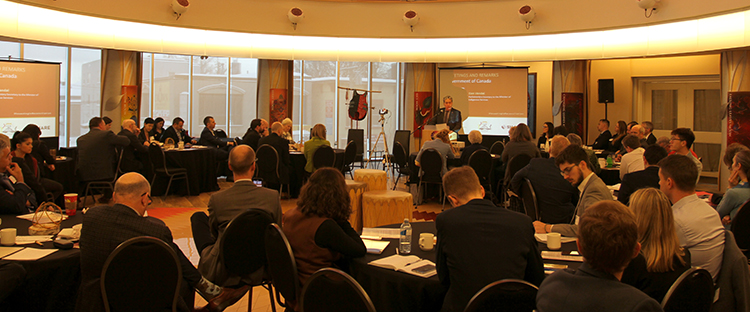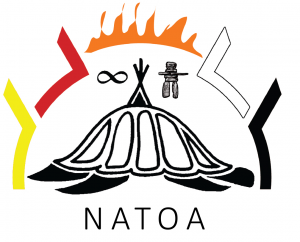
Reconciliation and the Role of the Indigenous Economy
In recent years, Canada has embarked upon a journey to reconciliation. At the core of this societal movement is the need to reconcile Indigenous and non-Indigenous peoples, nations, and ways of being and knowing. Reconciliation in Canada stems from growing recognition of the historical plight of Indigenous peoples through colonization, residential schooling, and other actions pursued to forcibly assimilate First Nations, Métis, and Inuit peoples, as well as acknowledgment of the continued barriers to Indigenous peoples’ wellbeing and success.
Canada’s Truth and Reconciliation Commission (TRC) (2008-2015) documented the many impacts of Indian Residential Schools, a state-sponsored assimilation strategy spanning the 19th and 20th centuries, and provided a framework for redress and reconciliation by publishing 94 Calls to Action. Of particular relevance to our work is Call to Action 92, which calls on corporate Canada to adopt the United Nations Declaration on the Rights of Indigenous Peoples (UNDRIP) as a framework for reconciliation, and instill it within corporate policies and processes. This includes engaging in meaningful consultation and obtaining Free, Prior, and Informed Consent (FPIC) prior to launching economic development projects; ensuring equitable access to jobs, training, and education opportunities in the corporate sector; educating and training management and staff on the history of Indigenous peoples; and more.
Many sectors, organizations, and individuals in Canadian society have taken great strides to redress wrongdoings against Indigenous peoples, and respect Indigenous rights and title. Indigenous peoples have, in their own right, pursued self-governance and self-determination through renewing Indigenous legal orders and governance structures, and reclaiming threatened languages and cultures. Yet historic exclusion from economic activities has slowed the emergence of a full, vibrant Indigenous economy.
 Within the investment world, reconciliation in Canada is largely in its infancy. As a result, in 2015, we founded the Reconciliation and Responsible Investment Initiative, which aims to align capital with Indigenous values. The Initiative has emerged through a partnership between the National Aboriginal Trust Officers Association (NATOA) and the Shareholder Association for Research and Education (SHARE). NATOA and SHARE have taken a multifaceted approach to reconciliation and responsible investment, working alongside Indigenous and non-Indigenous investors alike.
Within the investment world, reconciliation in Canada is largely in its infancy. As a result, in 2015, we founded the Reconciliation and Responsible Investment Initiative, which aims to align capital with Indigenous values. The Initiative has emerged through a partnership between the National Aboriginal Trust Officers Association (NATOA) and the Shareholder Association for Research and Education (SHARE). NATOA and SHARE have taken a multifaceted approach to reconciliation and responsible investment, working alongside Indigenous and non-Indigenous investors alike.
First, we aim to build investor leadership among Indigenous trusts as asset owners, supporting trusts’ efforts to align investment with community values, development aspirations, and economic reconciliation at large. In Canada, Indigenous communities increasingly control pools of investment capital developed either through own-source revenues, specific or comprehensive claims, or other financial settlements. Collectively, Indigenous trusts in Canada are valued at billions of dollars. Trusts established by First Nations, Métis, and Inuit communities are in a newfound position to increase Indigenous economic opportunities and exert influence as shareholders, all while fulfilling their fiduciary obligations and meeting financial goals. Trustees can thus mobilize a much larger pool of mainstream investment capital to support the growth of the Indigenous economy. To this end, our Initiative is facilitating dialogues and workshops with Indigenous trusts across Canada who wish to harness positive impact through responsible investment leadership.
NATOA President Mark Sevestre also serves as General Manager for the Community Trust of the Mississaugas of the Credit First Nation (MCFN). In the last year, the MCFN Community Trust began re-evaluating their investment policy. MCFN is looking to ensure their values and priorities are represented not just in the disbursements they make in their community – such as in funding educational, health, and language programming – but in their investment portfolio as well. Active ownership of these financial resources leverages trusts’ capacity to foster growth in line with Indigenous rights, values, and economic aspirations, delivering benefits well beyond those generated by trust incomes.
Second, we are working with institutional investors across Canada to promote responsible investment policies and practices in alignment with reconciliation. Our Guide for Investors sets out a number of key steps (Figure 1):

• Advance awareness;
• Recognize rights;
• Build respectful relationships;
• Integrate reconciliation into investment frameworks; and
• Invest in reconciliation and the Indigenous economy. For instance, private and public equity companies can make measurable commitments, like setting procurement targets, to foster growth in the Indigenous economy.
Beyond providing guidance to investors to instill reconciliation within their own policies and practices, we are also amplifying investor voices in support of Indigenous rights, and engaging with Canadian companies to seek demonstrable improvements in their policies and practices. SHARE works with a network of over 100 investment organizations–including foundations, religious investors, universities, pension funds, Indigenous trusts, and asset managers–with more than $22.5 billion in assets to improve corporate sustainability practices. Investors collaborate to see corporations prioritize diversity criteria in board representation, establish scholarships and apprenticeship programs for Indigenous youth, set Indigenous procurement and employment targets for Indigenous peoples and businesses, and more. In mobilizing investor leadership, we are building towards a more sustainable and inclusive economy.

It is our goal and belief that in activating both Indigenous and non-Indigenous investors to engage with corporations under the auspices of reconciliation, the corporate community will see the economic benefits of this process. Where Indigenous communities were overlooked or ignored by governments and corporations, negative outcomes have resulted for one or both parties. When both Indigenous and corporate parties are fully engaged, resulting outcomes include successful projects, advances to the Indigenous economy, and broad economic growth.
Ultimately, the Reconciliation and Responsible Investment Initiative is part of an emerging movement to align investment with reconciliation and Indigenous rights and values. Long-term investment returns depend on resilient communities and sustainable economies; as such, it is in the best interest of Indigenous and non-Indigenous investors alike to harness our collective power and better our shared future.
Please visit us to learn more or join us.
Article by Mark Sevestre, NATOA and Katie Wheatley, SHARE/RRII

Mark Sevestre – President, National Aboriginal Trust Officers Association. Mark is a Turtle Clan Mohawk from the Six Nations of the Grand River First Nation in Southern Ontario. Currently serving as the President, Mark is one of three founding members of NATOA in 2006. Mark also currently holds the position of General Manager of the Mississaugas of the Credit First Nation Community Trust, a $23 Million Indigenous Trust fund. Mark graduated with a Bachelor of Commerce Degree from Mount Allison University in 1991 and spent his early working career with the Federal Government’s Department of Indian and Northern Affairs, Industry Canada. Mark opened a Bank of Montreal Branch within a First Nation Community in Southern Ontario in the position of Branch Manager. Mark lives in Six Nations of the Grand River First Nation with his wife and two sons.
 Katie Wheatley – Originally from Montreal, Katie is the Project Lead of the Reconciliation and Responsible Investment Initiative. The Initiative, a partnership between SHARE and the National Aboriginal Trust Officers’ Association (NATOA), aims to promote responsible investment policies and practices that include reconciliation goals. Prior to joining SHARE in Vancouver, Katie worked for First Nations in Western Canada to protect their Indigenous rights and title and enhance environmental conservation through intergovernmental affairs. Previously, Katie advanced social development and reconciliation from within non-profit organizations, a private family foundation, and a municipal government in Eastern Canada. Katie holds a Bachelor of Arts in Joint Honours International Development and Anthropology, as well as a Master of Arts in Environmental Anthropology.
Katie Wheatley – Originally from Montreal, Katie is the Project Lead of the Reconciliation and Responsible Investment Initiative. The Initiative, a partnership between SHARE and the National Aboriginal Trust Officers’ Association (NATOA), aims to promote responsible investment policies and practices that include reconciliation goals. Prior to joining SHARE in Vancouver, Katie worked for First Nations in Western Canada to protect their Indigenous rights and title and enhance environmental conservation through intergovernmental affairs. Previously, Katie advanced social development and reconciliation from within non-profit organizations, a private family foundation, and a municipal government in Eastern Canada. Katie holds a Bachelor of Arts in Joint Honours International Development and Anthropology, as well as a Master of Arts in Environmental Anthropology.
Additional Articles, Energy & Climate, Impact Investing, Sustainable Business
Jeff Brown
Good article. Keep advancing the ball.